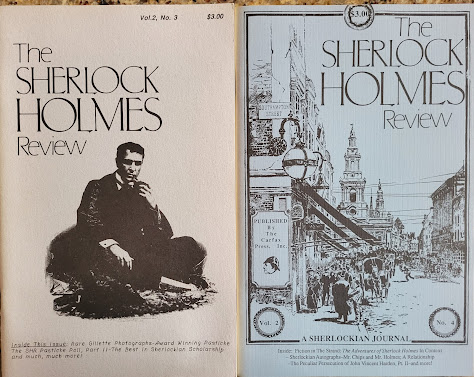I’ve thought of myself as a mystery writer for decades. It was a long time before anybody else did – long after my inaugural mystery appeared in print.
That occurred to me recently when I stumbled across copies of The Sherlock Holmes review from 1990 containing my first published fiction. “The Peculiar Persecution of John Vincent Harden,” a Sherlock Holmes pastiche, was serialized in numbers 3 and 4 of Volume 2. The quarterly SHR, like the new annual version, was edited by Steven T. Doyle with Mark Gagen as art director.
Thirty-two years later, my latest fiction is also a Holmes pastiche, a short novel called The Sword of Death, and the publisher is Gasogene Books, an imprint of Wessex Press, which is . . . Steve Doyle and Mark Gagen. A lot happened in between – a total of 22 mysterious books with my name on the spines.
Most of those works are part of my Sebastian McCabe – Jeff Cody mystery series, which is where my fiction-writing heart is. Although the series is set in the present day in a small town in Ohio, it owes a lot to Sherlock Holmes:
- Sebastian McCabe, the protagonist, is a Sherlockian.
- He frequently quotes or alludes to Holmes.
- Several of the titles in the series do likewise, most recently No Ghosts Need Apply.
- Like Holmes, Mac knows approximately everything.
- He has a friend (and brother-in-law), Jeff Cody, who chronicles his adventures.
- A number of other characters reappear across the cases as well, just as in the Canon. In the case of McCabe & Cody, the continuing cast is a larger one.
- The great man sometimes makes mistakes, but right always triumphs in the end.
- His relations with the police range from cordial to prickly.
- He uses tobacco (cigars) and plays music (bagpipes).
Readers have noticed that McCabe also bears some resemblance
to Nero Wolfe, in that he is rotund, has
no shortage of ego, and never uses a
small word when a large one suffices. Jeff’s
writing style is somewhat breezy, although I wouldn’t presume to say it is
Archie-esque.
The series also has parallels to Ellery Queen in the frequent use of the dying clue and the false solution tropes, with the occasional locked room murder. The Golden Age of Detective fiction is a major influence on my work.
But Sherlock Holmes is the greatest influence. T.S. Eliot may have gone too far when he said that every writer owes something to Holmes, but I certainly do.


Love it! You and Anne are cordially invited to our April 16th Nashville Scholars meeting. You can have the podium for 15 minutes!
ReplyDelete